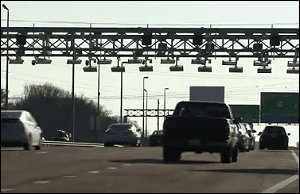The Federal Highway Administration is taking applications until Feb. 20 to allow up to three states to levy tolls on existing interstate highway segments, under a pilot program in which the previous participants never used their authority to begin tolling the highways.
The agency explained that while Congress originally established the pilot program in 1998, lawmakers in the 2015 Fixing America’s Surface Transportation Act set a three-year deadline (with a possible one-year extension) for states to either use or lose their right to toll existing interstate lanes.
The legislation allows states in the pilot to toll an existing interstate mainline to support the rehabilitation or reconstruction of the road. Missouri, North Carolina and Virginia previously occupied spots but none implemented tolling plans under the program.
So the FHWA said it “reclaimed slots that had not advanced and issued a new Federal Register notice to solicit applications from states interested in interstate tolling.”
Indiana has studied the feasibility of tolling some parts of its interstate highway system, and has recently issued requests for proposals to create a strategic plan for how the tolling would work.
The Oct. 20 Register notice said states can already assess tolls on new interstate lanes under certain conditions, or to convert a high-occupancy-vehicle lane into a price-managed lane.
But the FHWA’s pilot program provides the only federal authority for states to toll existing lanes to pay for rebuilding them, and the Notice said that applies to areas “that could not otherwise be adequately maintained or functionally improved without the collection of tolls.”
The FHWA said it will also conduct an informational webinar about the pilot program on Nov. 13.


